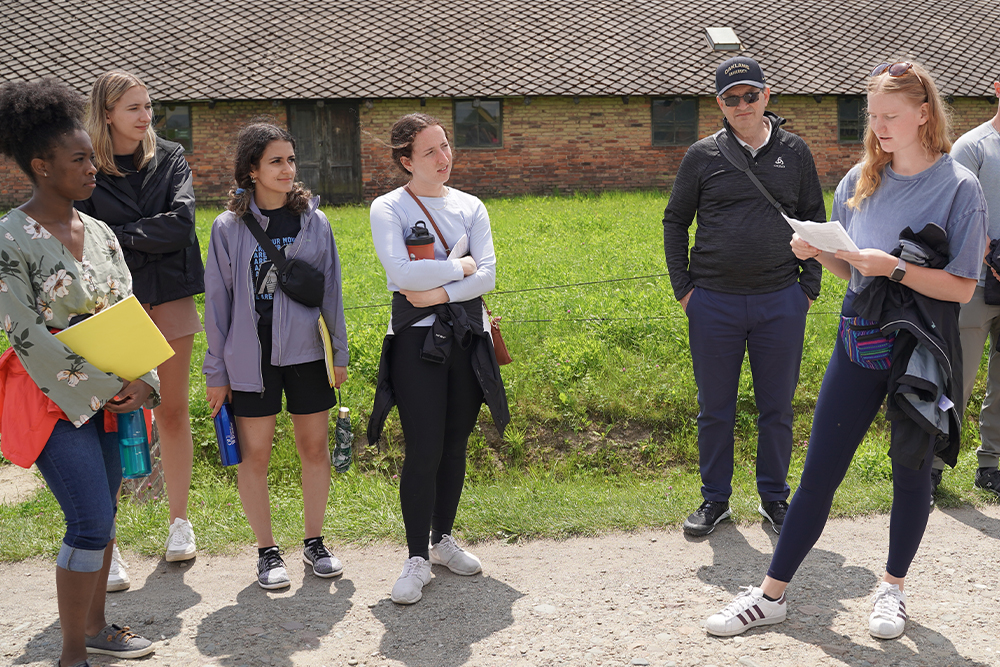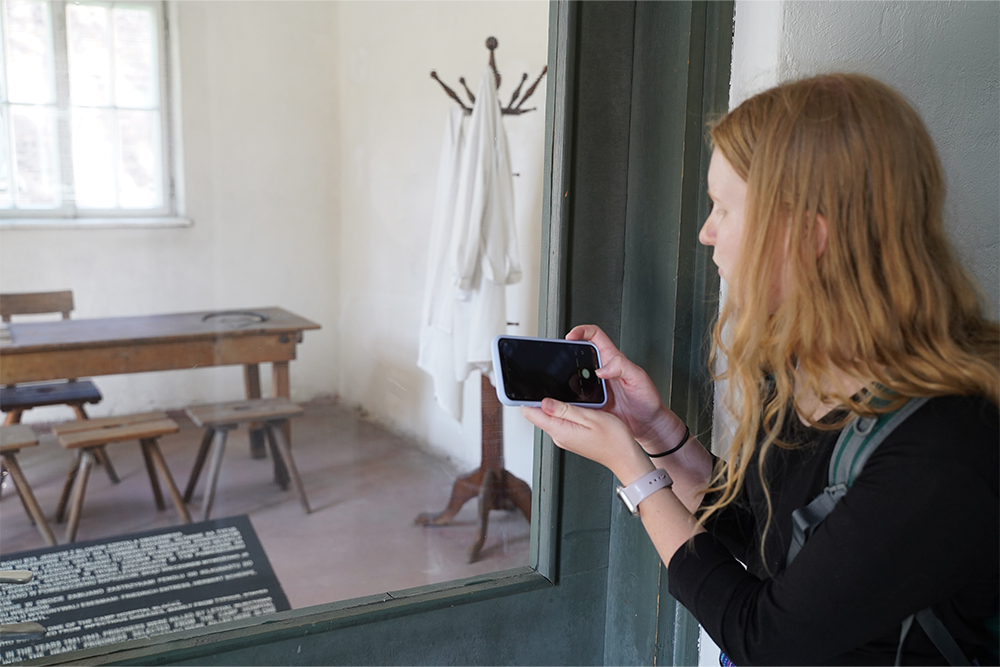
A third-year medical student from Oakland University William Beaumont Hospital was among speakers at a recent event highlighting the importance of future physicians studying medicine and the Holocaust.
“An Educational Roadmap from The Lancet Commission on Medicine, Nazism, and the Holocaust,” was presented Jan. 25 by the American Association of Medical Colleges (AAMC).
It was the third annual virtual event hosted by AAMC in observance of International Holocaust Day of Remembrance. Members of The Lancet Commission provided an overview of their 2023 report that aims to help people learn and reflect on the history of the Holocaust and medicine to the benefit of practitioners and patients alike.
Kristin Sarsfield, M3, OUWB, was among the speakers who addressed the importance of such studies, particularly for medical students. In 2022, Sarsfield was among the inaugural cohort to participate in the OUWB Study Trip to Auschwitz, which is part of the school’s Holocaust and Medicine program.
“I hope attendees gained a new perspective on the significance of Nazism and the Holocaust to the point of taking action,” Sarsfield said after she spoke last week.
“These actions need not be as grand as traveling, but can include educating themselves on the Holocaust, attending lectures, and writing reflections,” said Sarsfield. “I also hope that attendees involved in medical curriculum development were inspired to add Holocaust and Medicine content at their institutions.”
Sarsfield’s part of the presentation was called “Medicine During Nazism and the Holocaust.”
It centered on what she called a “highly transformative experience” she had during the 2022 OUWB Study Trip to Auschwitz, the first of its kind for a U.S.-based medical school. The study trip included educational tours and lectures in Poland’s Krakow and Oswiecim — home of Auschwitz I and Auschwitz II-Birkenau. The group also took part in daily reflective writing activities.
The program is designed to prompt the future physicians to delve into this distinctive and tragic era in the history of medicine and critically reflect on its implications for one’s own personal and professional development within the medical profession.
Sarsfield showed several photos from the study trip and talked about how it affected her.
Kristin Sarsfield takes a picture of a room at Auschwitz 1 where prisoners were killed between 1941-43 by lethal injections into their hearts. Sarsfield said being at the site physically had a big impact on her. |
“While at Auschwitz, we stood where countless atrocities occurred,” she said during the AAMC event. “We saw the camps, felt the breeze, touched the barrack walls…physical presence significantly increased the impact of the experience.”
“The trip was transformative to my medical education trajectory,” she added.
Sarsfield told attendees that the study trip’s theme, identified as a cohort, was “humanity.”
“Going on this trip really transformed my understanding of the word ‘humanity,’” said Sarsfield. “We saw what a lack of humanity did to humankind and that serves as such a consistent reminder for self-improvement and awareness daily, both as a human and as a growing physician.”
In fact, Sarsfield said that the experience has made her approach “each patient and family with additional respect and humility.”
She wrapped up her presentation by citing a quote from The Lancet Commission’s report:
“It is our conviction that the student of medicine, Nazism, and the Holocaust can help to prepare medical professionals to stand up against antisemitism, racism, and other forms of discrimination, and to embrace and defend our shared humanity their professional roles and as global citizens.”
Sarsfield called OUWB’s Study Trip to Auschwitz “a great step” towards meeting that goal.
David Skorton, M.D., president and CEO, AAMC, commented on the power of communication among medical students like Sarsfield on topics like the Holocaust and medicine
| More from OUWB |
OUWB Holocaust and Medicine program extends reach into community |
“So much important work goes on peer-to-peer, among the students themselves,” he said. “I’m actually quite optimistic that people like the panelists, in peer-to-peer ways, are actually going to have at least as much positive and salutary effect as any of us in positions where we have a lot of titles after our name.”
“I’m most encouraged by the younger folks who are doing this peer-to-peer because that’s our future and that’s much more effective, in my experience, than even any amount of required curricula,” he added. “I’m counting on our learners to help each other understand this.”
Jason Wasserman, Ph.D., professor, Department of Foundational Medical Studies, was among those who attended the virtual event that featured Sarsfield. He also serves as co-director of OUWB’s Study Trip to Auschwitz.
“It was wonderful to see one of our students represent our school and our program in such a prominent venue,” he said. “Her comments were thoughtful and she made us all proud.”
In addition to Sarsfield, OUWB was mentioned throughout the event.
That included a portion near the end, when the question was raised about how costs are covered for OUWB students who to travel to Europe for the study trip.
The question was addressed by Sarsfield and Hedy Wald, Ph.D., clinical professor, Family Medicine, Warren Alpert Medical School of Brown University, commissioner, Lancet Commission on Medicine, Nazism, and the Holocaust, and co-director, OUWB’s Study Trip to Auschwitz.
Together, they told the audience that the program is almost entirely funded by donors.
Sarsfield talked about how much it meant to her to be able to have a special dinner with those donors both before and after the trip.
“It was an incredible experience to have that face-to-face time with those community members who contributed to our education and growth,” she said.
Wald expressed gratitude to the “generous community donors” who want OUWB medical students to learn the lessons of the Holocaust and medicine.
“(Donors) feel so good about it, especially because we, or our relatives, will be that vulnerable patient in a hospital bed,” she said.
Overall, Wasserman said, “It's wonderful to see OUWB starting to get the recognition it deserves for being a leader in Holocaust and medical education.”
“From (OU President Ora Hirsch Pescovitz, M.D.) to (OUWB Retired Dean Duane Mezwa, M.D.) and (Christopher Carpenter, M.D, Stephan Sharf interim dean), Claus Weimann and the advancement office, and so many others, there has been a tremendous effort to create and support an unparalleled experience for our students and I'm so glad to see everyone's hard work, passion, and dedication is recognized,” he said.
For more information, contact Andrew Dietderich, marketing writer, OUWB, at [email protected].
To request an interview, visit the OUWB Communications & Marketing webpage.
This work is licensed under a Creative Commons Attribution-NonCommercial 4.0 International License.


